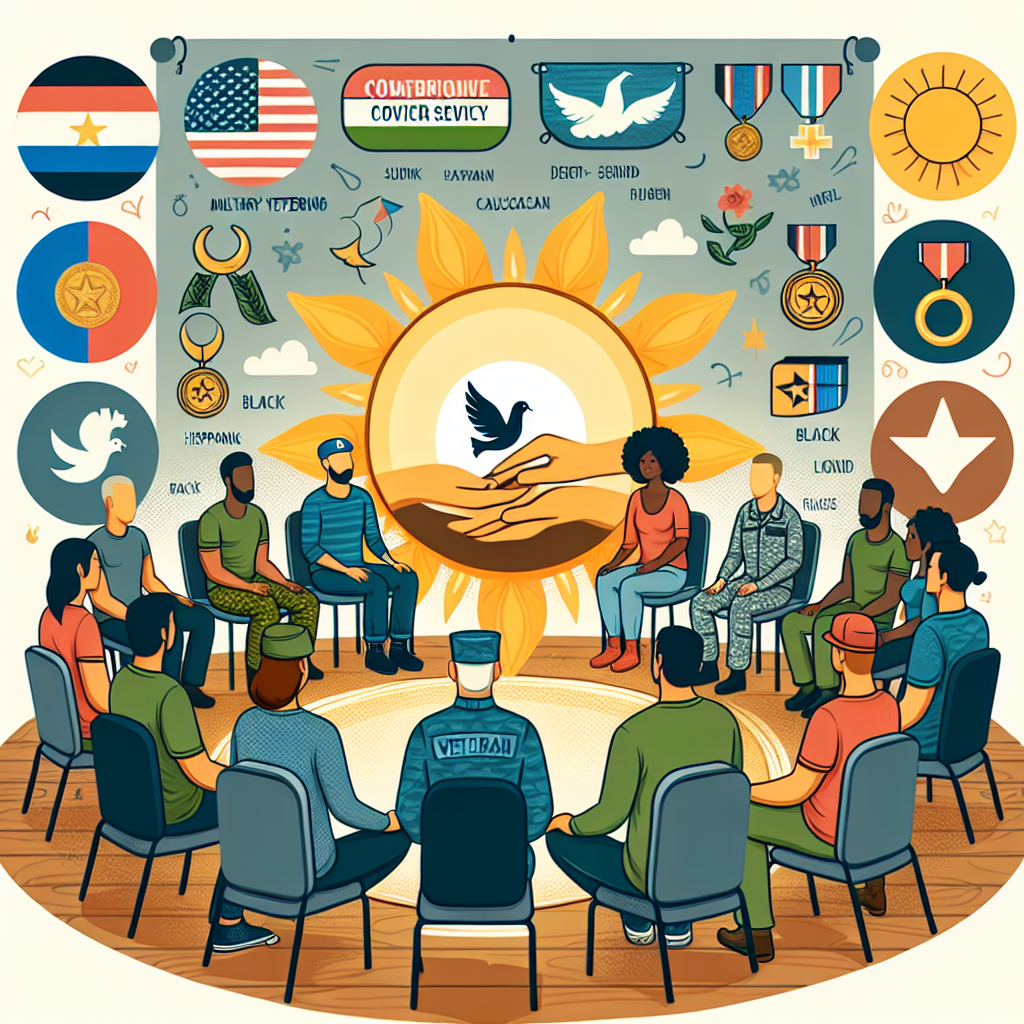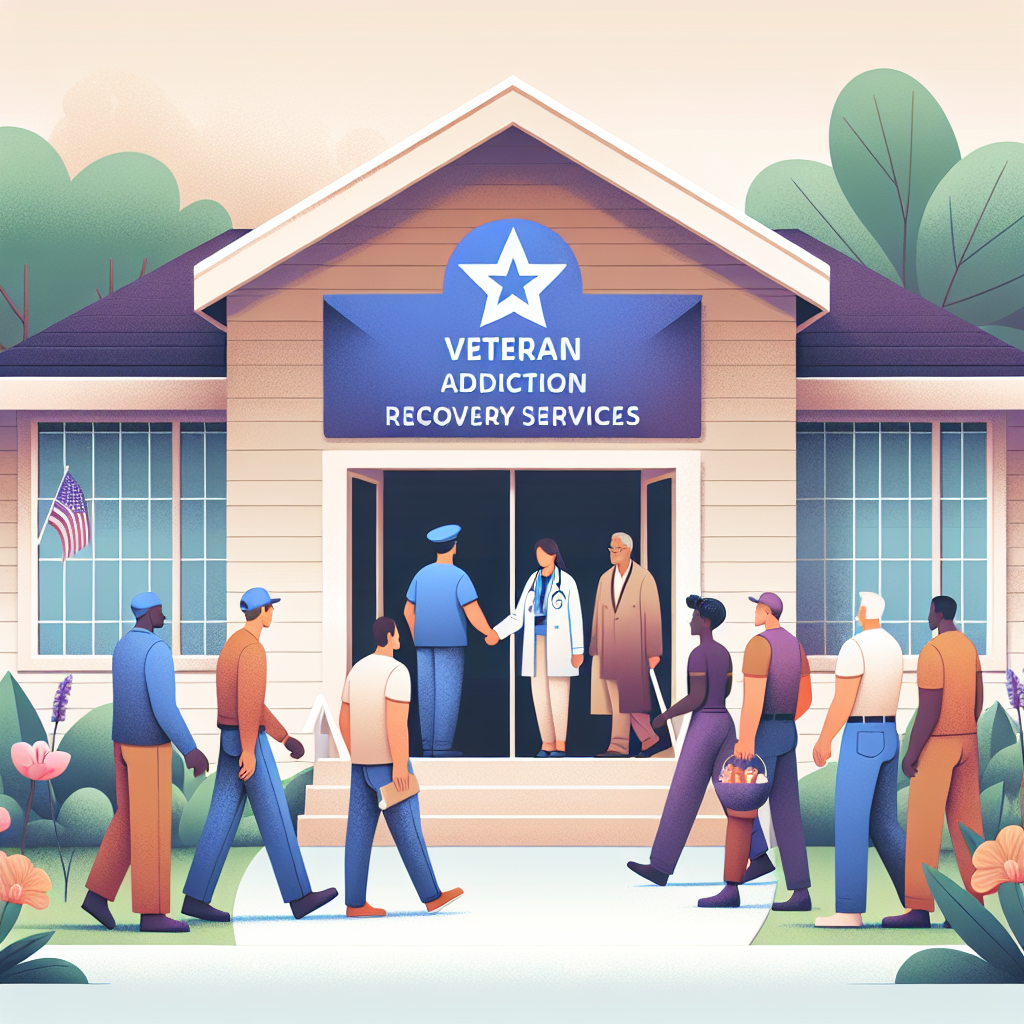-
Table of Contents

“Veterans’ Path to Recovery: Dedicated Support for a Brighter Tomorrow.”
Introduction
Addiction recovery services for veterans are specialized programs designed to address the unique challenges faced by military personnel who are struggling with substance abuse. These services often include a combination of medical treatment, counseling, and support groups tailored to the specific needs of veterans. Many programs are offered through the Department of Veterans Affairs (VA) and other veteran-focused organizations, providing comprehensive care that encompasses mental health support, trauma-informed therapy, and assistance with reintegration into civilian life. The goal is to help veterans achieve and maintain sobriety while addressing underlying issues such as PTSD, depression, and anxiety that may contribute to their addiction.
Comprehensive Addiction Recovery Services Available for Veterans
Veterans, who have dedicated their lives to serving their country, often face unique challenges upon returning to civilian life. Among these challenges, addiction can be particularly daunting. Fortunately, there are comprehensive addiction recovery services available specifically tailored to meet the needs of veterans. These services are designed to provide holistic support, addressing not only the addiction itself but also the underlying issues that may have contributed to it.
One of the primary resources available to veterans is the Department of Veterans Affairs (VA), which offers a wide range of addiction recovery programs. These programs are designed to be accessible and effective, ensuring that veterans receive the care they need. The VA provides both inpatient and outpatient treatment options, allowing veterans to choose the level of care that best suits their individual needs. Inpatient programs offer a structured environment where veterans can focus entirely on their recovery, while outpatient programs provide flexibility for those who may have other responsibilities.
In addition to the VA, there are numerous non-profit organizations dedicated to supporting veterans in their recovery journey. These organizations often provide specialized programs that address the unique experiences of veterans, such as trauma and post-traumatic stress disorder (PTSD). By offering a safe and supportive environment, these programs help veterans feel understood and less isolated in their struggles. Many of these organizations also provide peer support, connecting veterans with others who have faced similar challenges and can offer guidance and encouragement.
Another critical component of addiction recovery for veterans is mental health support. Many veterans struggle with mental health issues such as depression, anxiety, and PTSD, which can contribute to substance abuse. Comprehensive addiction recovery services recognize the importance of addressing these co-occurring disorders and provide integrated treatment plans that address both addiction and mental health. This holistic approach ensures that veterans receive the comprehensive care they need to achieve lasting recovery.
Furthermore, addiction recovery services for veterans often include family support programs. Addiction can have a profound impact on families, and involving loved ones in the recovery process can be incredibly beneficial. Family support programs provide education and resources to help families understand addiction and learn how to support their loved one in recovery. These programs also offer counseling and therapy to address any family dynamics that may have been affected by addiction.
In addition to traditional treatment methods, many addiction recovery services for veterans incorporate alternative therapies. These therapies, such as art therapy, equine therapy, and mindfulness practices, can provide veterans with new ways to cope with stress and emotions. By exploring different therapeutic approaches, veterans can find what works best for them and develop a personalized recovery plan.
The journey to recovery is not easy, but with the right support and resources, veterans can overcome addiction and build fulfilling lives. Comprehensive addiction recovery services for veterans are designed to provide the care and support needed to achieve lasting recovery. By addressing the unique challenges faced by veterans and offering a holistic approach to treatment, these services inspire hope and empower veterans to reclaim their lives. Through dedication, resilience, and the support of these specialized programs, veterans can find the strength to overcome addiction and thrive in their post-service lives.
How Veterans Can Access Specialized Addiction Recovery Programs
Veterans, who have dedicated their lives to serving their country, often face unique challenges when they return to civilian life. Among these challenges, addiction can be particularly daunting. Fortunately, there are specialized addiction recovery programs designed specifically to address the needs of veterans. These programs recognize the distinct experiences and traumas that veterans may have encountered, and they offer tailored support to help them on their journey to recovery.
One of the primary avenues through which veterans can access specialized addiction recovery services is the Department of Veterans Affairs (VA). The VA provides a comprehensive range of services, including medical detoxification, residential rehabilitation, outpatient treatment, and aftercare planning. Veterans can start by visiting their local VA medical center or contacting the VA’s Veterans Crisis Line for immediate assistance. The VA’s commitment to providing holistic care ensures that veterans receive not only addiction treatment but also support for any co-occurring mental health conditions, such as PTSD or depression, which are common among those who have served in combat.
In addition to the VA, there are numerous non-profit organizations dedicated to supporting veterans in their recovery journey. Organizations like the Wounded Warrior Project and the Substance Abuse and Mental Health Services Administration (SAMHSA) offer resources and programs specifically designed for veterans. These organizations often provide peer support groups, which can be incredibly beneficial for veterans who may feel isolated or misunderstood in traditional recovery settings. Connecting with others who have shared similar experiences can foster a sense of camaraderie and understanding, which is crucial for long-term recovery.
Moreover, many states have established veteran-specific courts that focus on rehabilitation rather than punishment for veterans who have committed non-violent offenses related to their addiction. These courts often mandate participation in addiction treatment programs and provide ongoing support and monitoring to ensure compliance and progress. This approach not only helps veterans recover but also reduces recidivism and promotes reintegration into society.
For veterans who may not be near a VA facility or who prefer alternative treatment options, telehealth services have become increasingly accessible. Telehealth allows veterans to receive counseling, therapy, and support from the comfort of their own homes. This can be particularly advantageous for those living in rural areas or those who may have mobility issues. The convenience and privacy of telehealth can make it easier for veterans to seek help without the stigma that sometimes accompanies addiction treatment.
Furthermore, many addiction recovery programs for veterans incorporate holistic and complementary therapies, such as yoga, meditation, and art therapy. These therapies can help veterans manage stress, process trauma, and develop healthy coping mechanisms. By addressing the mind, body, and spirit, these programs offer a well-rounded approach to recovery that can be more effective than traditional methods alone.
In conclusion, veterans have access to a wide array of specialized addiction recovery programs that cater to their unique needs. Whether through the VA, non-profit organizations, veteran-specific courts, telehealth services, or holistic therapies, there are numerous pathways to recovery. The key is for veterans to reach out and take the first step towards healing. With the right support and resources, veterans can overcome addiction and build fulfilling, healthy lives post-service. The journey may be challenging, but it is undoubtedly possible, and there is a community ready to support every step of the way.
Q&A
1. **Question:** Are there specialized addiction recovery services available for veterans?
**Answer:** Yes, the U.S. Department of Veterans Affairs (VA) offers specialized addiction recovery services for veterans, including counseling, medication-assisted treatment, and residential rehabilitation programs.
2. **Question:** Can veterans access addiction recovery services through non-VA organizations?
**Answer:** Yes, veterans can also access addiction recovery services through non-VA organizations, such as community-based programs, non-profits, and private treatment centers that may offer tailored support for veterans.
Conclusion
Yes, there are addiction recovery services specifically tailored for veterans. These services are provided by the Department of Veterans Affairs (VA) and include a range of treatment options such as inpatient and outpatient programs, counseling, medication-assisted treatment, and support groups. The VA also offers specialized programs to address co-occurring mental health issues, recognizing the unique challenges veterans may face. Additionally, various non-profit organizations and community-based programs also offer support and resources for veterans struggling with addiction.



